View the original article to see embedded media.
PARIS — The numbers, and not for the first time in this remarkable run, favored the opposition. Liverpool had 24 shots and an expected goals of over two, Real Madrid just four shots and an xG of under one. But it was, of course, the Spanish giant that won the UEFA Champions League title on Saturday here in the French capital, its record 14th European success story, for that is how it has been throughout the knockout stage and triumphs against PSG, Chelsea, Manchester City and now Liverpool: Madrid is under pressure, Madrid holds out, Madrid scores just when it needs to. If this did not feel quite so incredible as what had happened in previous rounds, it was perhaps only because this sort of performance has become so familiar.
In this era, in which managers speak of tactical philosophies, it is the great pragmatist Carlo Ancelotti who becomes the first coach to win the Champions League four times following the 1–0 triumph at the Stade de France. He has only ever won five league titles (one in each of Europe’s Big Five leagues, for what it’s worth). There is something paradoxical about that, but it fits the nature of this season and of this Madrid team.
There is a self-belief about Madrid that seems to make its opponents quail. Once Liverpool had failed to score early, belief almost visibly drained from the English challenger. Passes began to go astray, shots flew wide and there was one absurd moment that seemed to have led to the opening goal as Alisson and Ibrahima Konaté apparently became incapable of the most basic acts and ended up lying on the ground, the ball bouncing between them before Karim Benzema fired in, only to be denied by an offside flag.
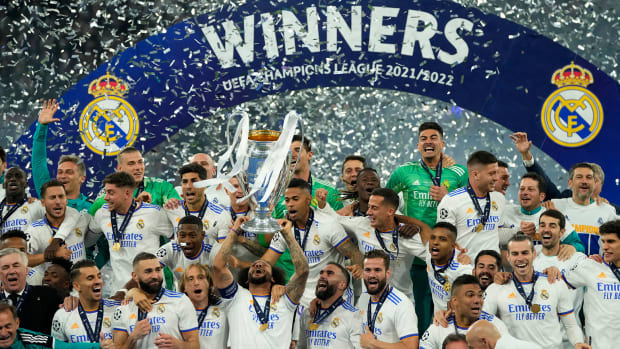
Manu Fernandez/AP
But still, the pattern was clear. Luka Modrić spoke afterwards of how he sensed Liverpool’s confidence waning. The coup de grace came just before the hour mark, with Vinícius Júnior arriving unmarked at the back post to turn in Federico Valverde’s cross. It was a fine cross and a fine run, but from a Liverpool point of view, the opening goal was far too straightforward. The danger as Madrid advanced and worked the ball to Valverde on the right was always Vinícius at the back post. Did Trent Alexander-Arnold not know he was there? Did he not suspect he might be? Was it just that Valverde’s low cross was so precise that there was nothing he could do? Either way, it looked dreadful as the ball skidded across the box and the young Brazilian was untended to turn the ball over the line.
The doubt about Alexander-Arnold—who was, as ever, a threat going forward—has always been his defensive qualities. Often it can seem like he takes the blame for balls being played behind him when really that has more to do with his team’s press. If he is not the best in one-on-one battles, it is forgivable because he is so good on the ball. But this just seemed to be a lack of defensive awareness.
And when Liverpool did begin to find some momentum in the second half, there was Thibaut Courtois, who twice denied Mohamed Salah with stunning saves as part of a record nine-save effort. It was to the big Belgian that Modrić ran to celebrate at the end of the game.
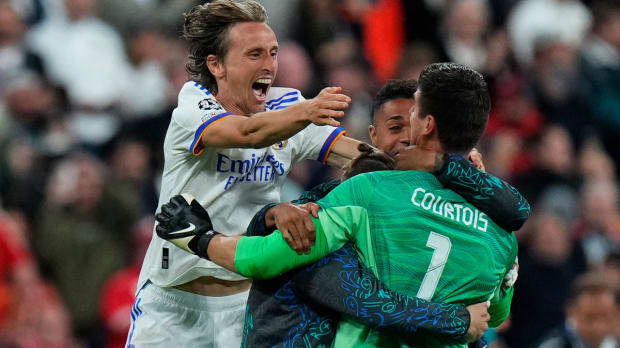
Petr David Josek/AP
But this was not, sadly, just a night to do with what happened on the pitch. This was another shameful night for UEFA, and another shameful night for French policing. Organization was inadequate to non-existent, with ticket and bag checks leading to bottlenecks. Police, inexplicably, refused to allow fans to walk on a road that had been closed to traffic, but blocked part of the pavement with vans, aggravating the problem.
As the number of fans built up, it became increasingly difficult for them to see where they were supposed to go, or for those with tickets to get to the front to get through to the gates. The problems were largely at the northwestern corner of the stadium, where Liverpool fans entered, and it was noticeable half an hour before kickoff how much more full the Madrid end of the ground was.
At that point, policed waived the first control point easing access, which was probably the only decision it could take, but the bigger question was how the buildup had been allowed to occur in the first place. Major stadiums only exist to stage major events and yet again and again—Wembley Stadium for the Euro 2020 final, Olembe for the Africa Cup of Nations last-16 tie, and again here—they have proved incapable of doing so. There was chaos as well at the Europa League final in Seville last week, with the stadium running out of water with temperatures soaring into the 90s. It’s as though the pandemic has robbed organizers of the memory of how to arrange these games properly.
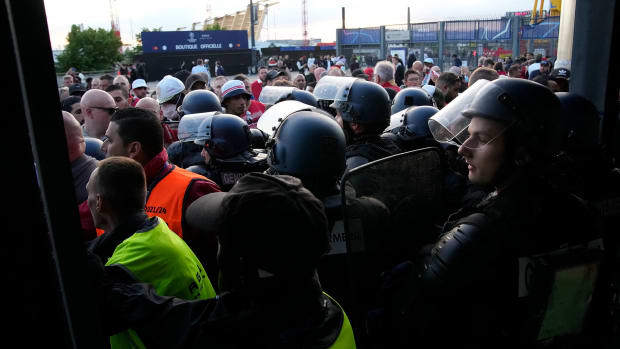
Christophe Ena/AP
Around 15 minutes before the scheduled kickoff there was an announcement that the match had been delayed. In Spanish the announcement blamed “security problems,” in English the “late arrival” of fans. Perhaps some did, but the truth is that problems had been obviously mounting for two to three hours before kickoff. Although some fans did climb fences and run through checkpoints, it was also clear this was an inexcusable failure in the part of the authorities. There was video footage of peaceful fans holding up tickets being pepper-sprayed by gendarmes from behind a locked gate.
French interior minister Gérald Darmanin claimed, "Thousands of British ‘supporters,’ without tickets or with counterfeit tickets, forced entry and sometimes assaulted the stewards." UEFA said Liverpool fans “who had purchased fake tickets which did not work” were responsible for blocking entrances, creating the bottlenecks.
Perhaps there were fans there without genuine tickets, but that cannot come as a surprise. Every major event has to deal with that. If France cannot, it should not host major games, and Liverpool has requested an investigation into the prematch chaos. It is UEFA’s responsibility to put in pace an adequate ticketing service. And none of that excuses the brutal behavior of the gendarmerie, or the scandal of fans who paid hundreds of dollars for tickets and did not get in.
Journalists reporting on the chaos were themselves targeted. “I got bundled into a hut by a security guard,” said Steve Douglas of the Associated Press, “told to remove accreditation, and then forced to delete video footage of the crowd issues otherwise I wouldn't be allowed back in.”
Gary Lineker, the former England international who is now a television presenter, was one of those who struggled to get into the stadium. “I’m not sure it’s possible to have a more poorly organised event if you tried,” he tweeted. “Absolutely shambolic and dangerous.”
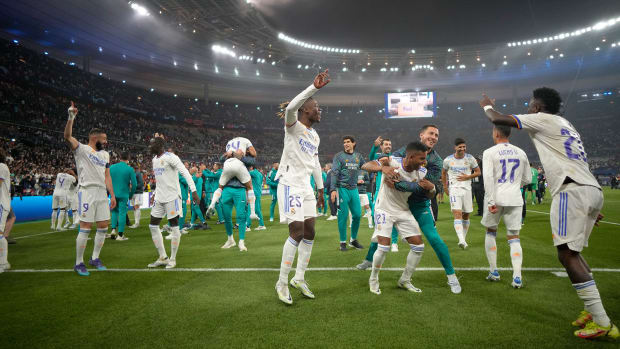
Kirsty Wigglesworth/AP
And then after all that, with kickoff delayed by 36 minutes, UEFA still went ahead with its entirely pointless opening ceremony, Camila Cabello singing on the pitch surrounded by flamenco dancers who had been waiting for almost an hour for their moment. Forget safety, forget decency, forget football, let the show, this farrago of greed, go on.
The Champions League continues to provoke mixed emotions. On the one hand, it is a dismal example of the financial stratification of European football. Madrid and Liverpool are two of the grandees of the game, so perhaps it doesn’t matter that this was the third time they have met in the final, but it does matter that there has been no finalist from outside Europe’s Big Five leagues (La Liga, Premier League, Bundesliga, Serie A, Ligue 1) since Porto in 2004.
But on the other, the latter stages of the Champions League almost certainly represent the greatest football that has ever been played. The concentration of talent at the biggest clubs allied to the attacking approach that characterizes almost all the modern elite have led over the past few years to a series of extremely dramatic games of extremely high quality. That is the challenge the Champions League presents: it is seductive and brilliant and yet it has destroyed football as the sport it used to be.
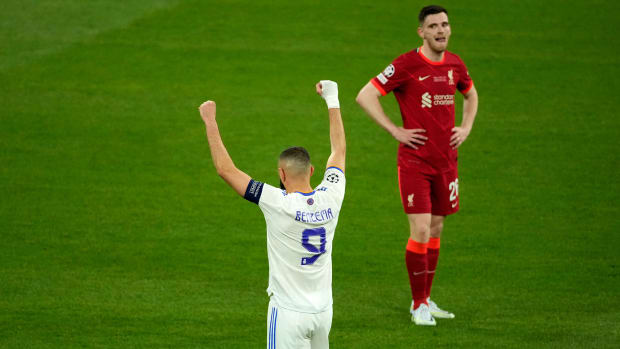
Christophe Ena/AP
And it will get worse. The group stage is far from perfect, an often grim slog before the real business begins, but it’s hard to see how the Swiss model, which will be introduced the season after next, will not be worse. So what do you do? Enjoy the spectacle and allow yourself to be swept along by the show? Or lament the betrayal of an ideal that, in all truth, had probably been soured long before the European Cup was instigated at a hotel four miles from the Stade de France?
That first season ended with a Madrid victory and so did this one. Liverpool, meanwhile, won the two domestic cups, lost the league by a point and lost this final. The FA Cup and the League Cup feels like scant reward for what was very nearly a perfect season. No goals in three finals perhaps suggests a greater problem for Liverpool; Jürgen Klopp’s record in finals, for such a successful coach, is not great.
Madrid—not to mention Ancelotti—has no such problems. La Liga’s double winners had an aging squad and may have missed out on signing Kylian Mbappé, the player they had decided was the one to take them into the future. But the club’s winning mentality—that inexplicable extra something that always seems to shine through on the Champions League stage even when the numbers, the matchup and all logic might dictate that it won’t be Madrid’s day—it remains as strong as ever.







